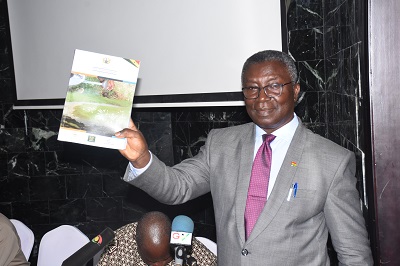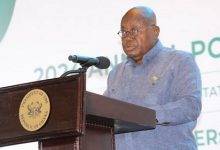

Environmental Scientist and Director of the Institute of Environment and Sanitation Studies (IESS) of the University of Ghana, Professor Chris Gordon, has called on the government to show stronger political will to tackle Ghana’s deteriorating ecological landscape.
In his view, the environmental challenges facing the country could not be handled with the “usual piece meal approach” but rather a right political will and attitude to deal with the threat in totality.
“You can have policies but you have to have the will to enforce it to make sure the right thing is done. If we do not have that in place, it doesn’t matter the laws we have, the launch of documents we do, nothing will change and it may get worst,” he stated.
Prof. Gordon was speaking while presenting an overview of a 2016 report on the state of Ghana’s environment in Accra on Wednesday.
The report, occasioned by the Environmental Protection Agency (EPA) since its last report in 2004, has analysed different documentations on the environment over the past 12 years to inform current trends that threatened nature.
It captured, among others, the sorry state of the country’s biodiversity, forest cover, wetlands, climate change, soil condition, coastal and marine ecosystems and fresh water resources, among others.
Factors including population growth, increased economic activities, emerging technologies, land degradation and unsanitary practices accounted for the depletion of Ghana’s nature conservation.
“We are finished, we are heading negatively downwards, things are not looking good because we are not changing the way we behave and how we are interacting with the environment. It is becoming worse than before,” Prof. Gordon lamented.
In terms of economic value to the country, the Environmental Scientist indicated that, “we lose between four to six per cent of Gross Domestic Product (GDP) from environmental degradation.”
“We lose about 400 million a year from poor sanitation so globally, it is estimated that Ghana loses at least three or four billion annually from poor environmental management,” he pointed.
The professor called for attitudinal change among the rank and file of society “right from our homes, community, churches, governmental institutions etc, to treat and respect our environment.”
“Ghana must have a well-developed structure and all-inclusive approach on environmental management policies to obtain a sustainable development, harness the powers of traditional authority and work to build a resource-efficient, low carbon economy,” he advised.
Launching the document, Minister of Environment, Science, Technology and Innovation (MESTI), Professor Kwabena Frimpong Boateng, disclosed that a policy on science, technology and innovation had been approved by cabinet after the inauguration of the advisory board.
He mentioned that research fund into the field had been reviewed upwards while the country was in the process of drafting a policy on plastic waste management and an implementation plan as part of measures to protect the environment.
The Minister re-echoed the need for attitudinal change and discipline amongst Ghanaians to deal with the rising environmental threats saying, “Sustainability cannot be achieved by government alone but requires the participation and intentional contribution of all members of our society.”
Acting Executive Director of the EPA, John Pwamang, expressed the hope that findings of the report would inform “ongoing debates on amendments to existing environmental legislations and the enactment of new ones to support the implementation efforts of relevant institutions in the environment sector.”
BY ABIGAIL ANNOH
PIX: OSA







